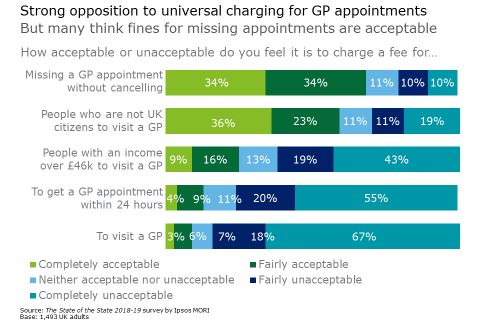Last week, my public sector colleagues, together with the think tank Reform, published their seventh annual report The State of the State 2018-19: Government beyond Brexit.1 The report once again brought together Deloitte and Reform to reflect on our most pressing public sector issues. The evidence for the report includes a deep analysis of published data, a citizen survey and exclusive interviews with the people who understand the public sector's challenges best – the people who run it. As in previous years, the NHS and social care are a central feature of the report, and I have used this week's blog to highlight the main findings on the 'State of the NHS and social care'.
About the State of the state 2018-19 report
This year's report comes a decade after the global financial crisis and finds the UK government amid the complex and politically charged challenge of leaving the EU. But while Brexit dominates daily headlines, the report finds a wider set of challenges – and opportunities – for government and the public services as they gear up for a new Spending Review.
One of the main findings in the report is that support for funding cuts has ebbed away over the past eight years. Indeed, the citizen survey, compiled by Ipsos MORI with responses from 1,071 UK adults, finds that eight years of austerity has seen a turnaround in attitudes to tax, spending and the scope of public services. Some 63 per cent of those surveyed were in favour of increasing government spending on public services, even if that means increases to some taxes, an increase risen from 46 per cent from 2009, as austerity was about to begin.2
Support for austerity appears to have halved since the beginning of the decade, with 54 per cent of the people in a 2010 Ipsos MORI survey agreeing with the need to cut public spending compared to just 19 per cent in this year's survey.
The survey finds a public that is increasingly concerned about public services, with the past four years showing a decline in the number of people who think that public bodies understand their needs, listen to their preferences and involve them in decisions. Looking to the future, the number of people who are worried that the state will provide too little support for them in the years ahead has risen from 50 per cent in 2010 to 70 per cent this year. The survey also finds that the number of people who believe the government does too much has fallen – from 64 per cent in 2010 to 41 per cent this year. That illustrates the scale of the challenge for policymakers, including the NHS, in considering how to reset the citizen-state relationship so that people take more responsibility for their own lives and rely less on public services.
The survey also revealed that when asked to pick two or three areas of public spending that should be protected from any spending cuts:
- 80 per cent chose the NHS
- 49 per cent chose education and schools
- 32 per cent chose the police
- only 27 per cent chose spending on social services for children and vulnerable adults
- and 25 per cent chose social services for older adults.
Digging into the data, different demographic groups prioritise different areas for protection. Perhaps inevitably, housing is a priority for Londoners, but also for single people and those working in more manual occupations. Social care for older people is a priority for those over 55, who are more likely to have older parents, and the NHS is more important to parents.
Senior executives across the UK's governments and public sector identified increasing organisational pressures, the impact of funding cuts on services and concerns over funding for the future as their 'stay awake' issues. However, they also talked about the opportunities presented such as:
- the potential for continued reforms, including greater regional devolution
- ongoing digital transformation
- more targeted talent management
- fresh progress on the industrial strategy
- clearer connection between budgets and outcomes
- charging for some elements of their offer as a way to alleviate both budget pressures and demand for services.
The key findings on the NHS and social care
The NHS and social care leaders that we interviewed argued that their current funding models are unsustainable and government faces a choice: either it takes decisive action to create a fair, sustainable funding system for social care, or it will be forced into costly reactive measures as a series of crises unfold.
One senior figure in healthcare warned those crises would be 'brutal'. NHS, social care and local government leaders also talked about the need to recalibrate citizen expectation towards more realistic provision. Many pointed to the need for greater self-care, perhaps supported by technology, as a crucial means for reducing demand on health and social care services.
The citizen survey asked specific questions about the NHS and explored the circumstances in which the public would find charges reasonable. It found strong opposition to charging for a GP appointment but that the most acceptable would be penalty fines for wasting public sector time, like missing NHS appointments (see Figure below).

The State of the State report offers a great deal of food for thought, not least in the changing attitudes of the public to austerity and the increase in the proportion of people who believe that the state should do more for them. For the NHS, this creates a real dilemma, as much of the 'prevailing view' is predicated on people taking more responsibility for their own health and well-being.
In reflecting on the overall findings, one thing is clear; ministers and officials face incredibly tough decisions in the Spending Review 2019, but, at the same time, the Review represents an opportunity for the government to chart a bold new course for public sector reform.
Footnotes
The content of this article is intended to provide a general guide to the subject matter. Specialist advice should be sought about your specific circumstances.
